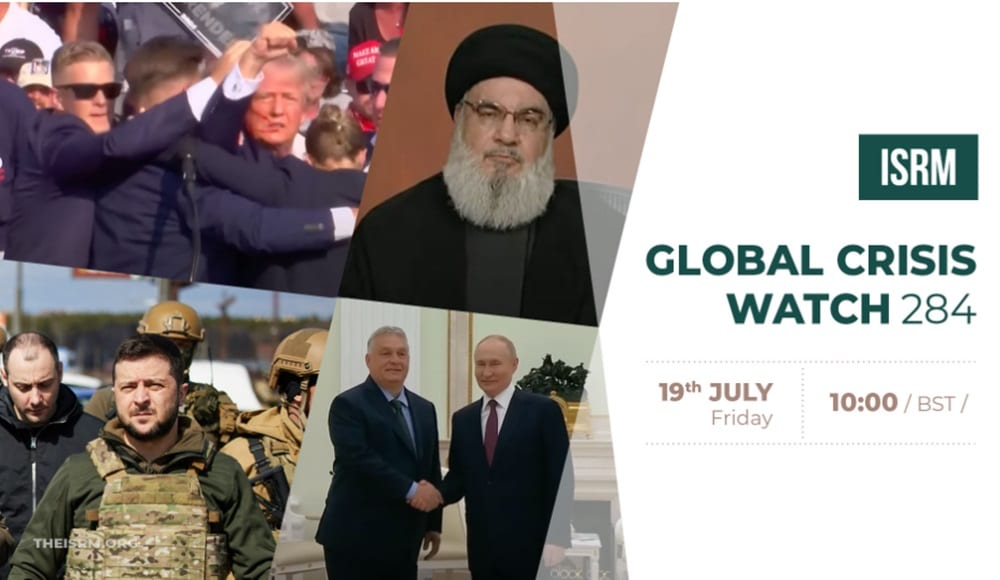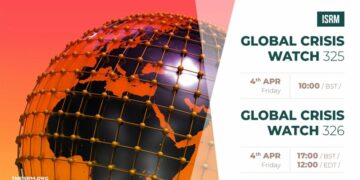The Institute of Strategic Risk Management, (ISRM), has sent out the invitation to its latest Global Crisis Watch, number 284, where topics of discussion will include the recent assassination attempt on Donald Trump, which has enhanced and further solidified the former President’s support base, the fact that Ukraine is becoming more open to negotiating with Russia, as well the Hungarian Prime Minister’s diplomatic “peace campaign” which has caused strife in the EU, and Hezbollah’s increasing threats to attack Israel.
The assassination attempt made against Trump made him more popular
Former US President Donald Trump has officially secured the Republican presidential nomination, just days after surviving an assassination attempt. The attack, which left Trump with a bandage on his ear, has drawn comparisons to similar incidents involving political figures like Brazil’s Jair Bolsonaro, former US president Ronald Reagan and India’s Narendra Modi, who all saw increased support following such events. As Bolsonaro’s critical injury in 2018 and Reagan’s shooting in 1981 preceded their electoral victories, analysts speculate that Trump may experience a similar surge in support as the November election approaches.
The Republican National Convention in Wisconsin saw a rapturous response to Trump’s appearance, with delegates cheering wildly as he took the stage. The convention’s focus has shifted to immigration, a central issue in Trump’s platform that helped him secure the GOP nomination in 2015. Trump’s campaign aims to present a more optimistic message to broaden his appeal among moderate voters and people of color. On the convention’s opening night, Trump appeared alongside his running mate, Ohio Senator JD Vance, while receiving an enthusiastic welcome from the crowd. Republican leaders are emphasizing the need for party unity and resilience, with speeches highlighting economic concerns and national security issues.
In contrast to the Republican’s show of unity there is still strong and growing pressure on President Biden to remove himself as the Democratic candidate, following his disastrous initial election debate with Trump and growing concern over both his physical and mental capabilities since then.
Ukraine is becoming more open to negotiating with Russia
Ukrainian President Volodymyr Zelensky has made a significant diplomatic move by inviting Russian representatives to a peace conference set for November. This gesture indicates a potential softening of Kyiv’s stance, a move that comes against a backdrop of military challenges and complex international dynamics. During a press conference on July 15, Zelensky announced his plan for a “just peace,” signaling an openness to direct negotiations with Moscow for the first time since talks broke down in 2022.
This shift, occurring just months before the crucial US presidential election, underscores the interconnectedness of Ukraine’s military support and American political outcomes. Zelensky’s plan focuses on three areas: Ukraine’s energy security, free shipping in the Black Sea, and prisoner exchanges, deliberately omitting a ceasefire. This move is seen as an effort to regain diplomatic momentum and engage global powers in a renewed dialogue on Ukraine’s future.
The Hungarian prime minister’s diplomatic “peace campaign” caused strife in the EU
At the recent NATO summit, Hungarian Prime Minister Viktor Orbán drew sharp criticism from his allies by meeting with Russian President Vladimir Putin and Chinese President Xi Jinping while bypassing a meeting with U.S. President Joe Biden. Orbán’s so-called “peace mission” aimed at negotiating a settlement to the Ukraine war without consulting other EU nations or the Biden administration has caused significant discontent.
Reports suggest that Orbán is planning to meet with Donald Trump at Mar-a-Lago, signaling his alignment with Trump’s foreign policy stance and his anticipation of a potential Trump re-election. Orbán’s actions, including his earlier meeting with Ukrainian President Volodymyr Zelensky, are seen as attempts to broker direct negotiations between Ukraine and Russia, despite Zelensky’s previous refusals. This move has raised alarms within NATO and the EU, especially given Hungary’s current presidency of the European Council, which Orbán could leverage to claim he is representing EU interests.
Hezbollah threaten increased attacks against Israel
Explosions have become the backdrop of summer in Tyre, an ancient Lebanese city, where the ongoing conflict between Israel and Hezbollah has become routine. The war in Gaza persists, and there are fears of a broader Middle East conflict with devastating consequences. For the past nine months, Israel and Hezbollah, backed by Iran, have been engaging in cross-border skirmishes.
If this escalates into full-scale war, it could surpass the destruction in Gaza, draw in other Iranian-backed militias from Iraq, Syria and Yemen, and possibly involve the US. Currently, a low-level conflict simmers along a 120km border stretch, with the potential to ignite the region. The United Nations has warned of a “catastrophe beyond imagination.” The recent assassination of Hezbollah commander Mohammed Nimah Nasser by Israel highlights the ongoing tension.
To register, click here
For more ISRM news, click here






